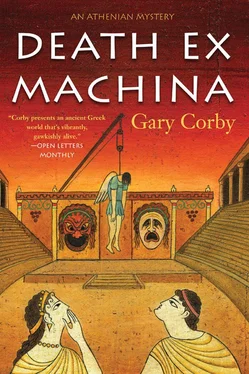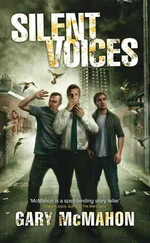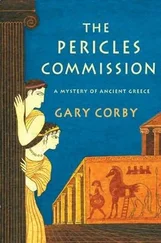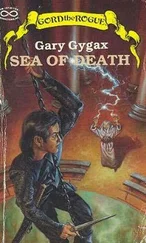Gary Corby - Death Ex Machina
Здесь есть возможность читать онлайн «Gary Corby - Death Ex Machina» весь текст электронной книги совершенно бесплатно (целиком полную версию без сокращений). В некоторых случаях можно слушать аудио, скачать через торрент в формате fb2 и присутствует краткое содержание. Год выпуска: 2015, ISBN: 2015, Издательство: Soho Press, Жанр: Исторический детектив, на английском языке. Описание произведения, (предисловие) а так же отзывы посетителей доступны на портале библиотеки ЛибКат.
- Название:Death Ex Machina
- Автор:
- Издательство:Soho Press
- Жанр:
- Год:2015
- ISBN:978-1-61695-520-5
- Рейтинг книги:3 / 5. Голосов: 1
-
Избранное:Добавить в избранное
- Отзывы:
-
Ваша оценка:
- 60
- 1
- 2
- 3
- 4
- 5
Death Ex Machina: краткое содержание, описание и аннотация
Предлагаем к чтению аннотацию, описание, краткое содержание или предисловие (зависит от того, что написал сам автор книги «Death Ex Machina»). Если вы не нашли необходимую информацию о книге — напишите в комментариях, мы постараемся отыскать её.
Death Ex Machina — читать онлайн бесплатно полную книгу (весь текст) целиком
Ниже представлен текст книги, разбитый по страницам. Система сохранения места последней прочитанной страницы, позволяет с удобством читать онлайн бесплатно книгу «Death Ex Machina», без необходимости каждый раз заново искать на чём Вы остановились. Поставьте закладку, и сможете в любой момент перейти на страницу, на которой закончили чтение.
Интервал:
Закладка:
Theokritos raised an eyebrow above a black eye. “For inciting a riot?” he asked.
“No. For murder.”
SCENE 37
“You had better have a good reason for this,” said the Eponymous Archon.
“I do, sir,” I said.
We were assembled once more in the courtyard of Pericles, everyone who had been there for the first meeting, plus Diotima, and Petros and Maia of the Phrygians.
The Eponymous Archon crossed his arms and stared at me in obvious anger. “You do realize, don’t you, that Theokritos is one of the most respected men in Athens? This charge is grotesque.”
I said, “I promise you that Theokritos is responsible for the death of Romanos.”
I turned to face the assembled personages, none of whom were smiling. Though this wasn’t a trial, it felt very much like one to me. I was all too aware that I had to defend my position here, or I might be the one who ended up facing the jurors.
I said, “Let me explain. The problem all along was to decide which of the three versions of Romanos was the victim. Was it Romanos the professional actor, or Romanos the metic with an extended family in Athens? Then there was the character Romanos played, Thanatos, the god of death.”
I paused to let them consider that, then added, “Initially it seemed the last option was best, that the killer had been out to murder Death.”
The Eponymous Archon snorted derision at that.
I said, “Yes sir, yet ridiculous as it sounds, Romanos died dressed as Thanatos, in a manner identical to the entrance of Thanatos in the play. We kept our eye out for someone so disconnected from reality that he thought killing fictional characters was a sane way to behave.”
“Was there such a man?” Pericles asked.
“There was one suspect who might fit the description,” I said. “A fanatical theater fan. But he proved innocent. The evidence he gave corresponded exactly with what we’d deduced not long before we met him: that Romanos must have been killed by more than one man.”
I explained the logic that one man alone could not have used the machine, that it must have been a group. I didn’t mention that it was Socrates who had deduced it.
I added, “One insane killer was believable, but no one could credit a whole group of them.”
Everyone nodded in agreement. Athens had its fair share of crazy people, but that would be stretching it even for us.
“This took us back to the first motive,” I said. “That Romanos had been killed because of his work as an actor. Here we had more luck. We discovered that Romanos the actor was prepared to do anything to claw his way to the top of his profession. Romanos was blackmailing Lakon.”
“Here now!” Lakon objected. “Surely we don’t need to go into that.”
“But I’m intrigued,” said the Basileus. He was obviously a gossip. “What did Romanos have against Lakon?”
Lakon looked into my eyes, imploringly.
“It was a … er … personal peccadillo,” I said. “One that might reflect on the first actor’s popularity with theatergoers.” It was technically true, while at the same time being a complete lie. Yet Lakon didn’t deserve to have his life destroyed.
Every man in the room contemplated Lakon with varying expressions of interest and intrigue. I could almost see the speculation running riot in their heads.
To quell it I said, “Gentlemen, we all have one or two little peccadilloes in our past, do we not? Ones that we’d rather our friends and acquaintances didn’t know about?”
Every man present older than thirty nodded.
I said, “Imagine how much harder such things must be for an actor, who relies on his good name for work.”
“Then it should be Lakon who murdered Romanos,” Sophocles said.
Lakon turned bright red with anger.
“This is a lie!” he shouted.
I shook my head.
“Your idea is very natural, Sophocles,” I said. “But there’s an objection to Lakon killing Romanos: why would he choose the moment that did himself the greatest possible harm? Lakon would have been better off waiting until after the Dionysia was over. Lakon himself pointed this out, and he was right.”
“Sometimes men act too soon,” Aeschylus said. “Or they act against their own interests. We all know the old saying, whom the Gods would destroy, they first cloud their minds and muddy their senses, so that their mistakes betray them.”
I said, “Aeschylus is correct that Lakon might have decided to murder Romanos. But we know that he didn’t, because of the evidence of the theater fan, the rather intense fellow I mentioned before. I can produce him for court. He was there that night. He saw a group kill Romanos, not a single actor. What group could that possibly be?”
There were expressions of bewilderment among my audience.
I said, “That brings us to the final version of Romanos: the private man. The most obvious candidate for a group of killers was the family of Romanos: the Phrygians.”
Everyone turned to stare at Petros and Maia, who stood side by side in a corner of the courtyard. They glanced at each other in open-mouthed surprise, then they said as one, “That’s not true!” Maia added, “I loved my brother.”
I ignored that and said to the assembly, “The Phrygians would certainly be convenient. Metics never get a fair trial, do they?”
“But what of a motive?” asked the Polemarch, whose job was to manage the affairs of metics. He was also a fair-minded man.
“The Phrygians are followers of Sabazios, who is a rival god to Dionysos,” I told them. “Maia and Petros and the other Phrygians had long been planning to hijack the Dionysia to promote their own faith … and their own drink.” I paused, then added, “We all know what that led to.”
There were growls of unhappiness from around the room, particularly from Pericles, whose party it was that had been destroyed.
I said, “Of course Romanos must have known of his family’s plan to spread the word of Sabazios by distributing beer. But the same grasping ambition that caused him to blackmail Lakon then surfaced against his own sister. Romanos decided to make beer and sell it, like we do wine.”
“What’s this?” Petros and Maia exclaimed.
I had no choice but to tell Maia of her brother’s plan to turn beer into a money-making venture. She didn’t believe me until I produced his notes, and told her of the hideaway he kept secret. I finished by saying, as gently as I could, “No doubt he did it to promote his own interests to become a citizen.”
Maia was visibly shaken.
“Then the case is simple,” said the Eponymous Archon. “The Phrygians, having learned that one of their number was set to betray them, killed the man before he could do so. Nothing could be simpler.” The city’s highest official spoke with obvious relief. “Any jury would convict them on that evidence.”
“Yes, sir, but the jury would be wrong,” I said. “The Phrygians had no idea what Romanos was planning. You need only look at Maia and Petros here to see how surprised and devastated they are by this news.”
“That’s not evidence,” the archon scoffed. “They could be acting.”
“They could be,” I agreed. “But it’s definitely evidence that the Phrygians invited my wife and me to attend their … er … religious observances.”
“So they’re a religious people,” said the Basileus.
“You could say that, sir,” I said with feeling. “The point is they made no attempt to hide their beer. If you had killed a man for such a reason, you would hide your motive, would you not? The fact that they went ahead and gave away the beer at the festival shows that they didn’t think they had anything to hide.”
Читать дальшеИнтервал:
Закладка:
Похожие книги на «Death Ex Machina»
Представляем Вашему вниманию похожие книги на «Death Ex Machina» списком для выбора. Мы отобрали схожую по названию и смыслу литературу в надежде предоставить читателям больше вариантов отыскать новые, интересные, ещё непрочитанные произведения.
Обсуждение, отзывы о книге «Death Ex Machina» и просто собственные мнения читателей. Оставьте ваши комментарии, напишите, что Вы думаете о произведении, его смысле или главных героях. Укажите что конкретно понравилось, а что нет, и почему Вы так считаете.












